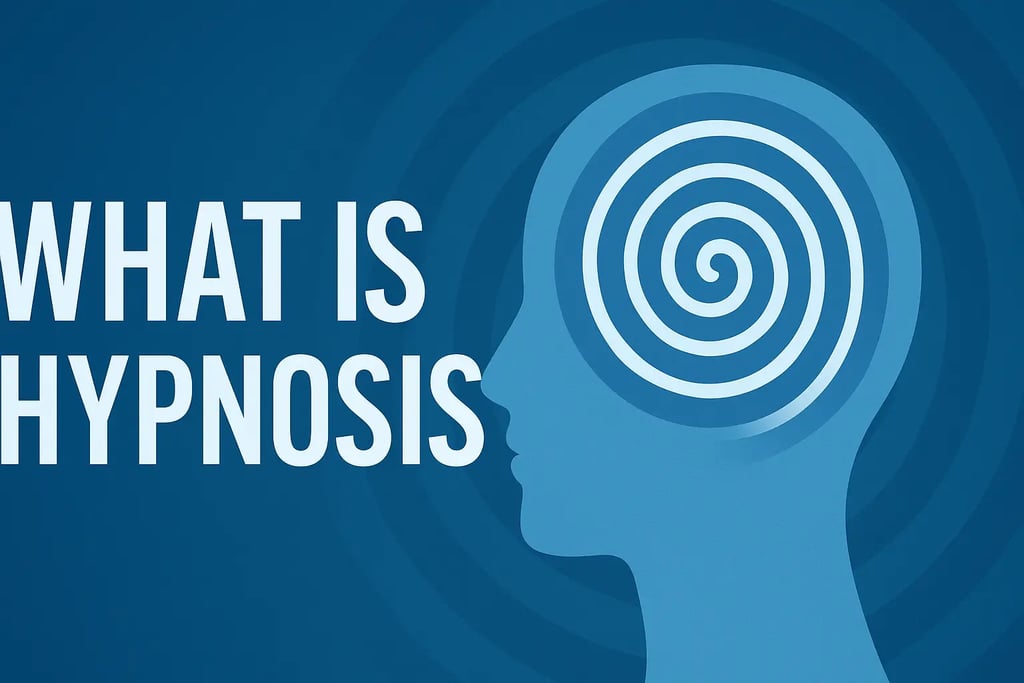What is Hypnosis? A Deep Dive into Its Meaning, Practice, and Effects
Discover what hypnosis truly is — its history, how it works, how to practice it safely, and the profound effects it has on the human body and mind. Learn about self-hypnosis, guided hypnosis, and professional hypnotherapy techniques.
EDUCATION


Understanding Hypnosis: Meaning and History
Hypnosis is a fascinating psychological state of focused attention and increased suggestibility — far removed from the myths of mind control often portrayed in movies. Its origins trace back to ancient Egypt and Greece, where healers used trance-like states for therapeutic purposes.
In the 18th century, Franz Mesmer introduced the concept of Mesmerism, which became the foundation for modern hypnotic practices. Later, pioneers such as James Braid and Sigmund Freud expanded its scientific understanding, integrating hypnosis into psychology and psychotherapy.
Despite its evolution, misconceptions persist. Scientifically, hypnosis is not a mystical power but a natural mental state where the brain shows altered activity in regions controlling attention and emotion regulation. This heightened focus allows individuals to respond more deeply to therapeutic suggestions.
Types of Hypnosis
Understanding the different forms of hypnosis helps identify which type suits your goals best:
1. Traditional Hypnosis
Conducted by a trained therapist, traditional hypnosis guides you into deep relaxation to address specific issues such as pain management, anxiety, or phobias.
2. Self-Hypnosis
In self-hypnosis, individuals hypnotize themselves without external guidance. This technique is often used for stress reduction, personal growth, and habit control.
3. Guided Hypnosis
Guided hypnosis involves recorded scripts or live sessions where the listener follows calming instructions to enter a relaxed state. It’s widely used in relaxation therapies and mental health treatments.
Each type of hypnosis offers unique benefits, and when practiced correctly, it becomes a powerful tool for emotional healing and mental clarity.
How to Practice Hypnosis Effectively
Practicing hypnosis requires preparation, focus, and consistency. Follow these steps to get started safely:
🧘 1. Create a Relaxing Environment
Choose a quiet, comfortable space free from distractions. Dim lighting, soothing background sounds, or deep breathing can help the mind settle into a receptive state.
🧠 2. Use Progressive Relaxation
Begin by consciously relaxing each part of your body — from your toes to your head. This method, known as progressive relaxation, helps reduce tension and prepare your subconscious mind for positive suggestions.
🌄 3. Incorporate Visualization
Visualize calming images such as a peaceful beach or forest. This deepens relaxation and enhances concentration.
💬 4. Introduce Positive Suggestions
Once relaxed, repeat short, positive statements like:
“I am calm and in control.”
“I release stress and embrace peace.”
“Every day, I grow more confident.”
Keep these affirmations clear, simple, and optimistic for maximum effect.
🕰️ 5. Be Patient and Consistent
Hypnosis is a skill — it improves with practice. Start with short sessions and gradually increase duration. Avoid forcing the process; let it flow naturally.
⚖️ 6. Seek Professional Guidance if Needed
For deep-seated issues such as trauma, chronic pain, or addiction, working with a certified hypnotherapist is advisable. Professionals ensure safe, structured sessions and can personalize therapy to your needs.
The Impact of Hypnosis on the Human Body and Mind
Hypnosis affects both physical and psychological processes, offering a variety of proven health benefits:
🩺 1. Physical Effects
During hypnosis, the body enters a deep relaxation state, leading to:
Reduced heart rate and muscle tension
Steadier breathing patterns
Lower stress hormone levels
These physiological shifts mirror those achieved through meditation or mindfulness, promoting overall calmness.
🧬 2. Long-Term Health Benefits
Regular hypnosis sessions can lead to:
Lower cortisol levels, reducing chronic stress
Enhanced concentration and mental clarity
Improved sleep patterns
Effective pain management (especially for chronic conditions)
Research shows hypnosis can even alter the brain’s perception of pain, helping patients manage discomfort more effectively.
💭 3. Psychological and Emotional Benefits
Hypnosis plays a crucial role in mental health care. It has been shown to:
Reduce anxiety and depression symptoms
Reprogram negative thought patterns
Support addiction recovery and behavior change
Assist with phobia treatment and emotional regulation
Through guided imagery and positive affirmations, hypnosis strengthens emotional resilience and promotes self-awareness.
Safety, Risks, and Myths About Hypnosis
When performed correctly, hypnosis is safe and non-invasive. However, some individuals may experience mild effects like dizziness, headache, or temporary disorientation after sessions.
Always ensure that hypnosis is conducted in a controlled and ethical setting — particularly if you are dealing with mental health conditions.
Common myths debunked:
❌ Hypnosis does not involve mind control.
❌ You cannot get “stuck” in hypnosis.
✅ It’s a scientifically supported therapeutic technique used by psychologists and medical professionals.
Final Thoughts
Hypnosis is much more than a mysterious trance — it’s a scientifically grounded method for healing, self-improvement, and stress relief. Whether you explore self-hypnosis at home or work with a professional, this ancient yet evolving practice can empower you to unlock the full potential of your mind and body.
